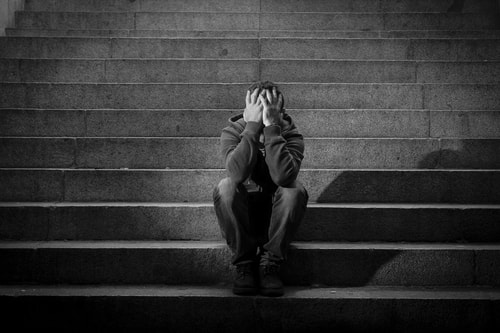
There are millions of articles, blogs, YouTube videos, and memes that instruct us how to squeeze the nectar out of life. However, for the seeker of fulfillment, there are far fewer guides that teach us about what pitfalls and traps to avoid along the way. In fact, positive psychology – the new science of happiness – offers some very definitive research and studies on what factors, circumstances, and attitudes in our lives with make us feel less happy.
The good news is that I sorted through the most up to date studies, surveys, and data to identify these 29 things that are scientifically proven to make you unhappy:
1. Holding a grudge
Too often, we cling to petty arguments, construed slights, and perceived wrongs. But when we allow our ego to hold grudges, our anger poisons our own happiness – not the other person’s.
2. Being too well off
Wait, making too much money will make us UNhappy? Are we sure we have that right? Yes, as numerous studies by the World Health Organization and others found that increasing income does correlate with increased levels of happiness UNTIL that income reaches a certain threshold. After that, you won't become happier just because of the dollars you make or what you have. (For that reason, depression is more prevalent in higher-income nations than poorer countries.)
You might be wondering what that income threshold is? About $70,000!
3. Giving up on our dreams
It matters not whether we’ll ever achieve them or not, but just the pursuit of our dreams has been proven to higher happiness levels. In fact, abandoning our dreams results in decreased levels of joy, passion, and emotional health.
4. Not making time for the things that bring us joy
Just like giving up on our dreams, when we don’t prioritize even a little time each day, week, or month for the things we love, our feelings of overall happiness are sure to sink.
5. Letting our minds wander
A 2010 Harvard study found that when our minds wander, we're significantly less happy. In fact, researchers found that our minds wandered about 46.9% of the time, no matter what we were doing. And while 4.6% of our happiness is attributed to what we're doing at that moment, 10.8% of our positive mental state is determined by our thoughts at any given time.
6. Superficial relationships
Research shows that when we “settle” and date, become friends with, or do business with someone who we don’t really like or respect, it holds us back from achieving greater fulfillment.
7. Not challenging yourself
Small goals + small aspirations + small effort = less happy. That’s the formula for NOT keeping a joyful, sunny outlook day in and day out. It seems that when we don’t challenge ourselves, we feel less connected, less part of something bigger than ourselves, and less passionate – all factors in unhappiness.
8. Comparing ourselves to others
Buddha said, “Comparison is the thief of joy,” and I definitely can’t put it any better than that. But most of us still do it, especially in this era of social media, television and advertisements, and the Keep-Up-With-The-Jones’ mentality.
9. Valuing things over memories and experiences
If you’re constantly focused on acquiring STUFF (no matter how nice that stuff may be!) over the more intangible goals of making lasting memories and enjoying experiences (especially with others), then your happiness will take a hit.
10. Not being appreciated/treated fairly at work
You may think that too much work (or having a job at all!) is the cause of your dissatisfaction, but that’s not the case. In fact, research proves that even with a heavy workload, it’s feeling underappreciated, treated unfairly, and undervalued by your employer that will sink your morale.
11. Not coping with our shame or guilt
They say that depression is anger turned inwards, and, likewise, when we carry guilt and shame about something we've done and don't come to terms with it and forgive ourselves, our daily joy will be impacted.
12. Self-medicating
Whether it's bad food, alcohol and drugs, painkillers, porn, or even addiction to work, we're self-medicating like never before – but not facing the cause of our unrest. In fact, Brene Brown put it best when he said, “The USA is the most medicated, in debt, addicted and obese nation in the world.”
13. Lack of sleep
Sleep science is an emerging field, as new research shows that our lack of sleep, restlessness due to overuse of electronics, and even sleep apnea are making us more prone to depression and high anxiety levels than ever before. It's hard to feel consistently happy when you're exhausted, burnt-out, and lacking energy.
14. Caring what others think
All the way back in the 1930s in his book, Conquest of Happiness, author and introspective icon Bertrand Russell identified "fear of public opinion" as a major cause of unhappiness. Now, think about how dangerous our current snake pit of social media and online opinions is to our mental health!
15. Not being close to siblings
This is one that I didn’t expect at all – the early connection with siblings. In fact, research from the American Journal of Psychiatry has shown that when we grow up without close relationships and bonds with our brothers or sisters, our risk of depression and unhappiness goes way up later in life.
16. Giving in to our fears.
Everyone is scared of something – or a lot of somethings – to varying degrees. But the good news is that the secret to happiness isn’t that we necessarily need to CONQUER those fears, we just can’t give up trying to face them. Try to confront your fears head-on and do a little better each day, and you’re already winning!
17. Not giving, volunteering, and contributing.
Studies show that our levels of satisfaction peak when we're giving – not receiving. In fact, those who volunteer, donate, or get involved with helping others regularly have been proven to live longer, stay healthier, and enjoy much higher levels of happiness!
18. Our favorite TV series ending?!
Seriously? Yup! We actually get down in the dumps when our favorite TV show or, now, Netflix series, ends. According to Emily Moyer-Guse, Ph.D., people form a ''parasocial relationship" with their favorite ongoing TV programs, and feel "distress" when they end. That backs up something called the "Avatar Effect" that was observed in viewers after the 2010 movie (because the utopian planet wasn't real) and the increase in depression among Harry Potter fans when the franchise ended in 2011.
19. Not being in the moment.
We think, analyze, scrutinize, anticipate, and plan for the future, or remember, relive, memorialize, or exaggerate the past. However, the modern person seems to have forgotten how to be awake, aware, and present right now!
20. Not being a part of something bigger than ourselves.
Researchers have identified areas called "Blue Zones" across the world, pockets where people typically live to 100 years with an excellent quality of life. They've studied the similarities in these Blue Zones, which include staying active, a specific diet, etc. But those variables also always include being part of a bigger community or movement, as human beings fundamentally need something bigger than ourselves to be happy.
21. Flat-out boredom.
Work. Pay bills. Home. Errands. Gym. Eat. Watch TV. Sleep. Repeat. The typical modern person is stuck on autopilot. While we're also more comfortable than ever, we don't have enough of the other things on this list to break us out of our boring routines.
22. Coveting what others have.
We WANT more than ever, and it's making us miserable. If you want to be happy, practice GRATITUDE every day instead of WANTING that car, house, job, vacation, more money, a better body, or the perfect relationship.
23. Facebook and social media (again).
Are you starting to see a common theme? Researchers have identified something called the "Compare and Despair Effect," in which feelings of jealousy, suspicion, and discontent in their relationships increases as they spend more time on Facebook. Likewise, a study by University of Michigan psychologist Ethan Kross discovered a correlation between time spent on Facebook and feelings of dissatisfaction, loneliness, and isolation in participants.
24. Too much freedom of choice?!
Human beings value their freedom above all else, but only within the last generation or two in human history have we run into an unprecedented phenomenon - too much choice. Believe it or not, having the luxury of unending choices and decisions can actually sink the psyche. Consider two research projects published by the Stanford University's Department of Psychology and Colombia University, which discovered that too much freedom of choice makes us feel “bewildered,” misguided, disconnected, and even depressed.
25. Junk food and an unhealthy diet.
The average American is now fatter, unhealthier, and more diseased than ever, and our diet is the leading cause part of that problem. But more than just physical manifestations, a poor diet is also linked to stress, depression, anxiety, anger, and even mental illness, as documented in studies by the Public Health Nutrition journal. In fact, they found that people who regularly eat commercial fast food (hamburgers, hotdogs, soda, doughnuts and pizza) were 51% more likely to develop depression, compared to those who eat little or none. If you want to feel happy, eat a clean, healthy diet!
26. Living in high altitude?!
I didn’t expect to read about this one! But studies have shown that when human beings start living higher up (2-3,000 feet and higher), their rate of suicide increases. Dr. Barry E. Brenner explains that "The correlation is very, very, very high, and it happens in every single region of the US."
Based on two decades of mortality data collected from the U.S. Centers for Disease Control and Prevention, they found that hypoxia, a lack of oxygen to the body's cells and tissues that occurs at higher altitudes, may cause profound mood disturbances, often leading to suicide.
27. Not socializing.
In his 2011 bestselling book, Positive Psychology, New York Times columnist David Brooks highlights research that sometimes, it’s the simple things that keep us happy. In fact, he shares data that “the daily activities most closely associated with happiness are social,” such as “socializing after work” and “having dinner with friends.” So, if you want to be happy, go hang out with your friends and coworkers!
28. Technology over interaction
It's apparent that we're slaves to our smartphones and screens, but that practice is also pulling us away from something that is fundamental to happiness: human interaction. In fact, the father of psychology, Sigmund Freud, anticipated the human isolation technology would cause way back with the advent of the telephone! In 1930, Freud wrote, "If there had been no railway to conquer distances, my child would never have left his native town and I should need no telephone to hear his voice.”
Much more recently, clinical psychologist and MIT professor Sherry Turkle writes in her 2011 book, Alone Together, that “online life tends to promote more superficial, emotionally lazy relationships, as people are drawn to relationships that seem low risk and always at hand.”
29. Lack of exercise
Want to feel better almost instantly? From a scientific standpoint, there is nothing better to boost the “happiness chemicals” in the brain, improve oxygen intake, lower stress, and brighten your mood than vigorous exercise. And you don’t have to hit to the gym to feel the benefit, as even some simple yoga, pushups and situps at home, or a brisk walk will do the trick!
-Norm :-)





















 RSS Feed
RSS Feed